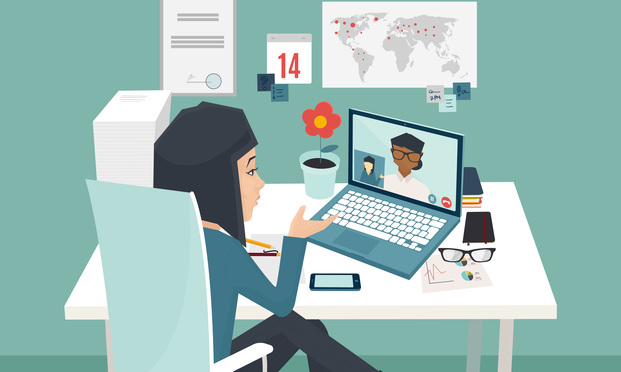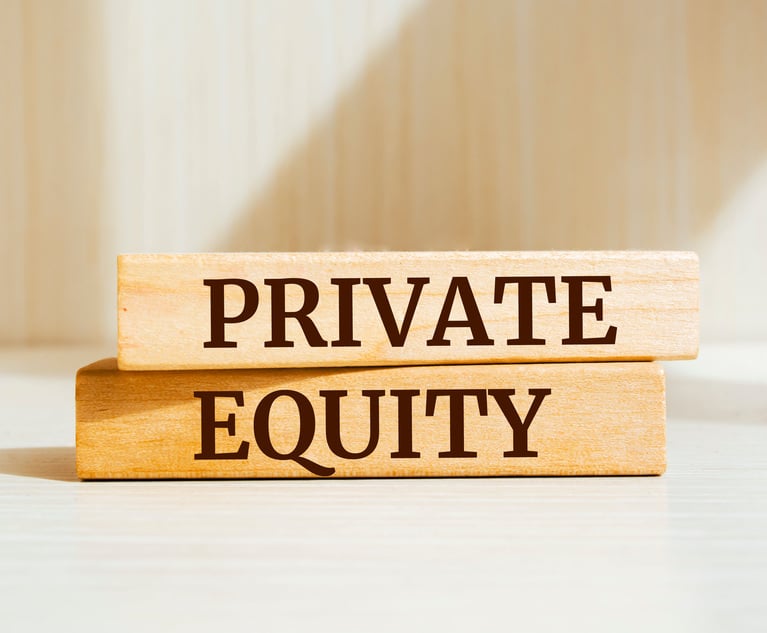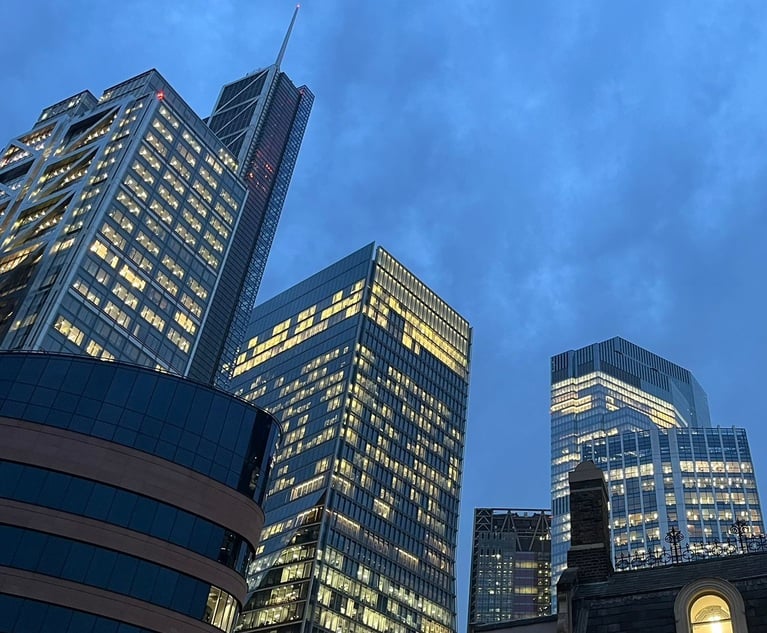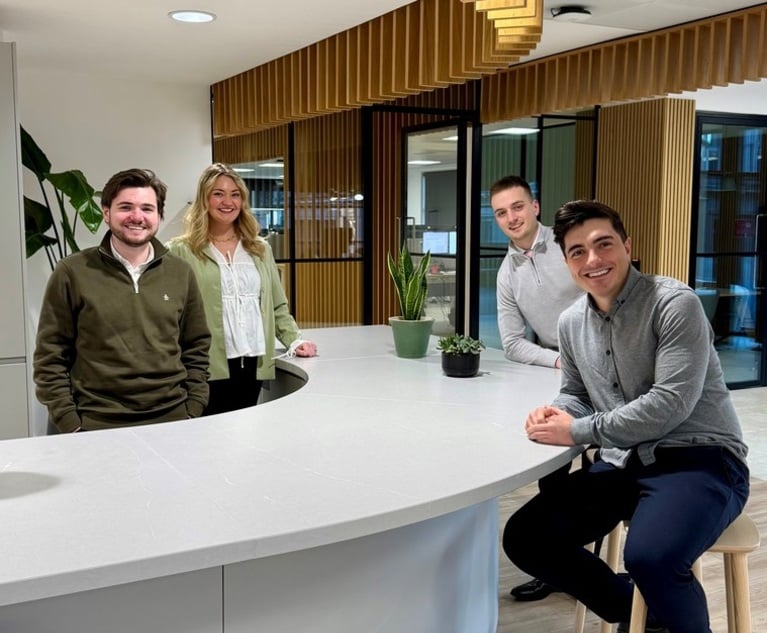The COVID-19 Effect: Can Remote-Working Bring Lawyers and Clients Closer Together?
With lawyers adjusting to home working for an indefinite period, could their less formal surroundings bring them closer to their clients?
March 20, 2020 at 09:42 AM
5 minute read
 Video calling is on the up. But can remote-working engender closer lawyer-client relationships?
Video calling is on the up. But can remote-working engender closer lawyer-client relationships?
For lawyers, getting to know key clients on a personal level can be a challenge, particularly in a rigid corporate environment that has long emphasised professionalism.
But the coronavirus pandemic has turned the lawyer-client dynamic on its head. As top international firms continue to encourage lawyers to work from home, some now say that the informality of the home working set-up has driven more personal interactions – and trust – between the two groups.
"Everyone is working from home and by definition more informally," says Michal Berkner, an M&A partner in Cooley's London office. "Now it's okay if you're on Zoom with a client in more casual clothing. It would be weird if someone put on a suit at home. This might hasten along the trend for people to be more casual in the office."
Berkner also suggests that working from home might have mental health benefits, "people will feel that they are more able to be themselves".
"There's that sense of being in the trenches together, and it brings people closer."
She adds: "The other day a client asked to see my new puppy on a client call, so I showed it to her and the conversation took a more personal tone. This will allow people to break down the gap between having a 'work face' and a 'home face'."
Other lawyers speak of the unique challenges of the current climate, and how they are driving closer relationships.
"There is a lot of panic in the media and out there in general, so I think that feeds into your interactions with clients," says a senior associate based in the London office of a U.S. firm. "Everyone is trying to make tough calls and make sure that the client's interests are being protected. There's that sense of being in the trenches together, and it brings people closer."
But it isn't just clients who might benefit from a more relaxed culture among lawyers.
Managers, including senior partners, are now required to check in with their teams more to ensure they have the resources to work from home. This may lead to deeper and more pervasive remote-working freedoms for lawyers when the coronavirus outbreak subsides, as firms recognise the effectiveness of their IT systems.
"Relationships can be developed digitally in the informal confines of the home. It's like you're welcoming the client into your home."
"You could look at this very positively, in that everyone will now be thinking about remote-working, everyone will change their expectations of it and know that they can work from home," says independent disputes expert Laura Durrant.
"On the other hand, people might hate this so much that it might polarise people. Firms should be thinking about how you might manage that risk of polarising so that everyone knows that they are in this together. They should also be thinking about what lessons they can take from this so that they still support flexible working once this is over, but can return somewhat to normality."
But for all of the challenges it presents, remote working seems — at least for now — to be something that lawyers have taken to well.
An M&A partner at a U.S believes that working remotely will be the new norm, and that it can only mean positive things where clients are concerned.
"This is a globalised world. Travel costs are bad for the environment and in this digital age are less important than say 15 years ago," he says.
He also suggests that face-to-face contact has always come with the condition of formality, which generally draws a barrier between lawyer and client.
"It's a myth to say face-to face-is always better. A suit used to mean 'get the job done'. But now it means stiff, rigid, formal and, frankly boring. This is 2020. Relationships can be developed digitally in the informal confines of the home.
They add: "It's like you're welcoming the client into your home."
Melanie Leach is the founder and director of FLAME PROOF, a coaching organisation that draws on acting techniques and skills to teach people how to effectively express themselves in a business environment. She started her life working as an actress in the RSC, BBC and National Theatre, and has now worked with McDonalds' legal team and one of the world's largest technology companies. She advises lawyers to pay extra attention to how they present as more and more work from home, with video chat functions increasingly used. She shares her top tips below.
- Be Professional: Etiquette, time management, stage management, pre-empt what the participants want from the session.
- Be Ready: Can you be seen and heard and does the participant want to be visible?
- Be Prepared: On Time, Script, Framing of Messages so that you can focus on delivering the right experience
- Be Present: The eyes have it – if we are distracted, if we are not on brief, it will show!
- Be Authentic: Be yourself, the technology won't improve your performance, it has to come from you!
- Be Aware: Listen as the camera and audio amplifies what you are thinking
- Be Interactive: Adapt to participants' responses to the experience shifting and stay in character and on brief!
- Be Respectful: Acknowledge and flex your style according to the client's expectations and culture
- Be Proactive: How do the participants want to connect in future and what assets do they need from you?
This content has been archived. It is available through our partners, LexisNexis® and Bloomberg Law.
To view this content, please continue to their sites.
Not a Lexis Subscriber?
Subscribe Now
Not a Bloomberg Law Subscriber?
Subscribe Now
NOT FOR REPRINT
© 2025 ALM Global, LLC, All Rights Reserved. Request academic re-use from www.copyright.com. All other uses, submit a request to [email protected]. For more information visit Asset & Logo Licensing.
You Might Like
View All

The Merricks-Mastercard Fallout: ‘Defendants Will Be Rubbing Their Hands with Glee’

‘Raises More Questions Than Answers’: Partners Puzzled by Leadership Change at UK Competition Regulator

Law Firms Mentioned
Trending Stories
- 1Orrick Picks Up 13-Lawyer Tech, VC Group From Gunderson Dettmer
- 2How Alzheimer’s and Other Cognitive Diseases Affect Guardianship, POAs and Estate Planning
- 3How Lower Courts Are Interpreting Justices' Decision in 'Muldrow v. City of St. Louis'
- 4Phantom Income/Retained Earnings and the Potential for Inflated Support
- 5Should a Financially Dependent Child Who Rejects One Parent Still Be Emancipated?
Who Got The Work
J. Brugh Lower of Gibbons has entered an appearance for industrial equipment supplier Devco Corporation in a pending trademark infringement lawsuit. The suit, accusing the defendant of selling knock-off Graco products, was filed Dec. 18 in New Jersey District Court by Rivkin Radler on behalf of Graco Inc. and Graco Minnesota. The case, assigned to U.S. District Judge Zahid N. Quraishi, is 3:24-cv-11294, Graco Inc. et al v. Devco Corporation.
Who Got The Work
Rebecca Maller-Stein and Kent A. Yalowitz of Arnold & Porter Kaye Scholer have entered their appearances for Hanaco Venture Capital and its executives, Lior Prosor and David Frankel, in a pending securities lawsuit. The action, filed on Dec. 24 in New York Southern District Court by Zell, Aron & Co. on behalf of Goldeneye Advisors, accuses the defendants of negligently and fraudulently managing the plaintiff's $1 million investment. The case, assigned to U.S. District Judge Vernon S. Broderick, is 1:24-cv-09918, Goldeneye Advisors, LLC v. Hanaco Venture Capital, Ltd. et al.
Who Got The Work
Attorneys from A&O Shearman has stepped in as defense counsel for Toronto-Dominion Bank and other defendants in a pending securities class action. The suit, filed Dec. 11 in New York Southern District Court by Bleichmar Fonti & Auld, accuses the defendants of concealing the bank's 'pervasive' deficiencies in regards to its compliance with the Bank Secrecy Act and the quality of its anti-money laundering controls. The case, assigned to U.S. District Judge Arun Subramanian, is 1:24-cv-09445, Gonzalez v. The Toronto-Dominion Bank et al.
Who Got The Work
Crown Castle International, a Pennsylvania company providing shared communications infrastructure, has turned to Luke D. Wolf of Gordon Rees Scully Mansukhani to fend off a pending breach-of-contract lawsuit. The court action, filed Nov. 25 in Michigan Eastern District Court by Hooper Hathaway PC on behalf of The Town Residences LLC, accuses Crown Castle of failing to transfer approximately $30,000 in utility payments from T-Mobile in breach of a roof-top lease and assignment agreement. The case, assigned to U.S. District Judge Susan K. Declercq, is 2:24-cv-13131, The Town Residences LLC v. T-Mobile US, Inc. et al.
Who Got The Work
Wilfred P. Coronato and Daniel M. Schwartz of McCarter & English have stepped in as defense counsel to Electrolux Home Products Inc. in a pending product liability lawsuit. The court action, filed Nov. 26 in New York Eastern District Court by Poulos Lopiccolo PC and Nagel Rice LLP on behalf of David Stern, alleges that the defendant's refrigerators’ drawers and shelving repeatedly break and fall apart within months after purchase. The case, assigned to U.S. District Judge Joan M. Azrack, is 2:24-cv-08204, Stern v. Electrolux Home Products, Inc.
Featured Firms
Law Offices of Gary Martin Hays & Associates, P.C.
(470) 294-1674
Law Offices of Mark E. Salomone
(857) 444-6468
Smith & Hassler
(713) 739-1250








